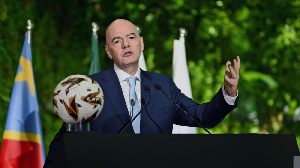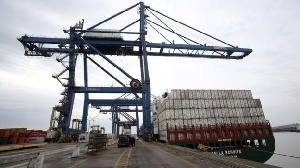Agriculture still remains a key priority of the government though the sector has in the last few years lost its prime spot as the largest contributor to the Gross Domestic Product (GDP) to the service sector, President John Dramani Mahama has asserted.
That, President Mahama emphasised, was part of his government's vision to ensure food security in the country. “Despite the fact that the agricultural sector has lost its prime spot as the largest contributor to GDP to the services sector, agriculture remains a key priority of Government. Government's vision to ensure food security in Ghana has been largely achieved,” he noted in the 2014 State of the Nation address recently.
In 2013, the United Nation Food and Agriculture Organisation (FAO) and the Africa Union Forum for Agricultural Research in Africa (FARA) recognised Ghana for achieving the Millennium Development Goal (MDG) of reducing hunger and malnutrition in advance of the 2015 target.
That feat, according to the President, was achieved through the use of improved planting material, subsidised fertilizers, extension services, and access to credit.
He added: “we have achieved surpluses in our traditional staple crops: cassava, yam, plantain and maize. This has enhanced food security in Ghana, as these foods are now plentiful in the market at reasonable prices.”
In spite of the successes chalked, President Mahama admitted that many challenges still confronted the agriculture sector. In particular, he mentioned access to credit, lack of mechanised equipment for large-scale commercial rice production and non- availability of sufficient irrigated lands. However, he assured, “Government is focused on partnering with the private sector to eliminate as many of these constraints as possible".
Speaking on some of the interventions government had put in place to tackle the challenges in the sector, the President indicated that within the past year, Government completed rehabilitation work on some viable irrigation schemes and added more than 1,200 hectares of land to the stock of irrigable land, mainly for rice production. Another 8,000 hectares have been added by the private sector, to supplement the flaw of nearly 6,000 hectares of land in the three Northern regions alone. “That is 15,200 hectares of land total, all devoted to rice cultivation. It is my firm belief that if we maintain this progress, we are making in rice production, Ghana will, in the near future, become a net exporter of rice.”
He maintained that government had sustained its programme of subsidies for fertilizer and improved seeds.
The fertilizer subsidy programme, he said, had increased in quantity from below 50,000 metric tons in 2008 when it was initiated to 150,000 metric tons in 2013. “This year, 2014, the subsidy is expected to cover a volume of 180,000 metric tons. I am also pleased to report that as a result of measures put in place, the incidence of smuggling of the product has largely been curtailed.”
President Mahama called on the private sector to partner with government to create new instruments that could allow both parties to share both the risk and benefits of such large scale undertakings, which would trigger a more sustainable transformation, to deliver prosperity to Ghanaians.
Business News of Friday, 7 March 2014
Source: The Public Agenda
Agriculture still gov’t’s key priority — Mahama
Opinions












